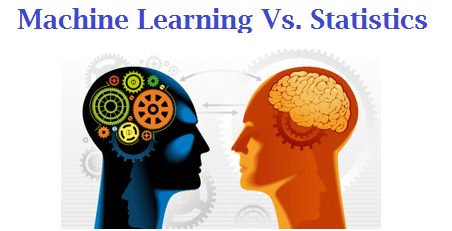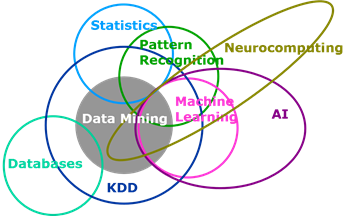This article was written by Aatash Shah.

Many people have this doubt, what’s the difference between statistics and machine learning? Is there something like machine learning vs. statistics?
From a traditional data analytics standpoint, the answer to the above question is simple.
- Machine Learning is an algorithm that can learn from data without relying on rules-based programming.
- Statistical modeling is a formalization of relationships between variables in the data in the form of mathematical equations.
Machine learning is all about predictions, supervised learning, unsupervised learning, etc.
Statistics is about sample, population, hypothesis, etc.
Two different critters, right? Well, let’s see if they are actually that different!
Both machine learning and statistics have the same objective:
According to Larry Wasserman,
“They are both concerned with the same question: how do we learn from data?” In his blog, he states how the same concepts have different names in the two fields,
| Statistics | Machine learning | |
| Estimation | ~ | Learning |
| Classifier | ~ | Hypothesis |
| Data Point | ~ | Example/ Instance |
| Regression | ~ | Supervised Learning |
| Classification | ~ | Supervised Learning |
| Covariate | ~ | Feature |
| Response | ~ | Label |
Robert Tibshirani, a statistician and machine learning expert at Stanford, calls machine learning “glorified statistics”.
Nowadays, both machine learning and statistics techniques are used in pattern recognition, knowledge discovery and data mining. The two fields are converging more and more even though the below figure may show them as almost exclusive.

Source: SAS Institute; A Venn diagram that shows how machine learning and statistics are related
Both machine learning and statistics share the same goal: learning from data. Both these methods focus on drawing knowledge or insights from the data. But, their methods are affected by their inherent cultural differences.
They’re related, sure. But their parents are different.
A statistical model, on the other hand, is a subfield of mathematics.
Machine learning is comparatively a new field.
Cheap computing power and availability of large amounts of data allowed data scientists to train computers to learn by analyzing data. But, statistical modeling existed long before computers were invented.
Methodological differences between machine learning and statistics:
The difference between the two is that machine learning emphasizes optimization and performance over inference which is what statistics is concerned about.
This is how a statistician and machine learning practitioner will describe the outcome of the same model:
ML professional: “The model is 85% accurate in predicting Y, given a, b and c.”
Statistician: “The model is 85% accurate in predicting Y, given a, b and c; and I am 90% certain that you will obtain the same result.”
Machine learning requires no prior assumptions about the underlying relationships between the variables. You just have to throw in all the data you have, and the algorithm processes the data and discovers patterns, using which you can make predictions on the new data set. Machine learning treats an algorithm like a black box, as long it works. It is generally applied to high dimensional data sets, the more data you have, the more accurate your prediction is.
In contrast, statisticians must understand how the data was collected, statistical properties of the estimator (p-value, unbiased estimators), the underlying distribution of the population they are studying and the kinds of properties you would expect if you did the experiment many times. You need to know precisely what you are doing and come up with parameters that will provide the predictive power. Statistical modeling techniques are usually applied to low dimensional data sets.
To read the full original article click here. For more machine learning statistics related articles on DSC click here.
DSC Resources
- Services: Hire a Data Scientist | Search DSC | Classifieds | Find a Job
- Contributors: Post a Blog | Ask a Question
- Follow us: @DataScienceCtrl | @AnalyticBridge
Popular Articles
